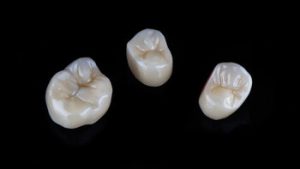If you’re considering dental crowns as a solution to protect or restore your teeth, you’re likely wondering about the cost. Dental crown costs can vary widely depending on various factors, and understanding these can help you make an informed decision. In this comprehensive guide, we’ll break down the dental crown treatment process, explore cost factors, and discuss treatment options to suit your needs.
What Are Dental Crowns and Why Are They Needed?
Dental crowns, sometimes called tooth crowns, are custom-made caps designed to cover and protect damaged, decayed, or misshapen teeth. They restore the natural appearance and normal function of the tooth while safeguarding your oral health. Crowns can also enhance an attractive smile, especially for front teeth.
When Might You Need a Dental Crown?
Here are some common reasons you may need a dental crown:
- Decayed teeth: To protect and strengthen teeth severely damaged by decay.
- Broken teeth: To repair and restore a tooth’s shape and function.
- Misshapen teeth: To improve aesthetics and achieve a natural appearance.
- Weak teeth: To prevent further cracking or splitting.
- After a root canal or root canal therapy, seal and protect the treated tooth.
- For back teeth to withstand the pressure of chewing.
Types of Dental Crowns: Which One Is Right for You?
Choosing the right crown depends on your dental needs, aesthetic goals, and budget. Here are some popular options:
Ceramic Crowns
Ceramic crowns are highly favoured for their natural appearance and are ideal for front teeth. They seamlessly merge with your natural teeth and are often a top choice for their aesthetic appeal.
Porcelain Crowns

Zirconia Crowns
Renowned for their durability and aesthetic appeal, zirconia crowns are a cost-effective solution for those looking for long-lasting results with a polished look.
Metal Crowns
Metal crowns, made from metal alloys, are incredibly durable and often used for back teeth where chewing pressure is higher. These can include a metal core for added strength.
Resin Crowns
While less expensive, resin crowns are less durable than other options and may wear down over time.
Temporary Crowns
Temporary crowns are used during the dental crown procedure to protect the prepared tooth until the permanent crown is ready.
The Dental Crown Procedure: What to Expect
The dental crown procedure typically involves several steps:
Step 1: Initial Consultation
At your first consultation, your dentist will evaluate your teeth and recommend a treatment plan, including the most suitable crown type for your needs.
Step 2: Tooth Preparation
The existing tooth is reshaped to create space for the crown. For weak teeth or those with tooth decay, a filling may be done first to build up the tooth structure.
Step 3: Impressions
Impressions of the prepared tooth are taken and sent to a dental laboratory to craft your custom-designed crown.
Step 4: Temporary Crown
A temporary crown is sealed to protect the tooth while waiting for the permanent one.
Step 5: Final Fitting
Once the permanent crown is ready, it’s bonded to the tooth using advanced adhesives, ensuring a snug and durable fit.
What Factors Influence Dental Crown Costs?
The cost of dental crowns varies significantly depending on:
- Material Used: Ceramic and zirconia crowns often cost more than resin or metal crowns.
- Dentist’s Experience: Highly skilled dentists may charge more for their expertise.
- Dental Laboratory Fees: Crowns made in more advanced dental labs can raise the overall cost.
- Location: Costs may vary widely based on your city or region.
- Additional Procedures: Treatments like root canals or extractions can add to the cost.
- Health Insurance Cover: Check if your health insurance or health funds cover part of the tooth crown cost.
How Much Does a Dental Crown Cost in Australia?
In Australia, the dental crown cost typically starts from 1,500 AUD. The final cost varies based on the type of crown, the materials used, and other factors. For example:
- Porcelain crowns or zirconia crowns start at 1,500 AUD.
- Metal crowns start at 1,200 AUD.
- Resin crowns start at 1,000 AUD.
These starting prices generally include the entire process, from consultation to crown placement.
Hidden Costs to Watch Out For

- Additional diagnostic tests like X-rays.
- Repairs or adjustments for a damaged tooth after the crown placement.
- Crown repair is needed in case of unforeseen complications.
Financing Options for Dental Crowns: Accessible and Flexible Solutions
Dental crowns are a valuable investment in your oral health and attractive smile, but their cost can sometimes feel like a hurdle. Fortunately, various financing options are available to make this essential treatment more affordable, including flexible payment plans and programs like TLC and the National Dental Plan. Here’s a breakdown of how you can manage the cost of your dental crown treatment.
TLC (Total Lifestyle Credit) Payment Plans
TLC offers a convenient and flexible way to finance dental crowns and other dental treatments. With tailored payment plans, patients can access high-quality care without the burden of immediate upfront payments. Key features of TLC include:
- Financing options for treatment costs ranging from minor to major dental work.
- Competitive interest rates.
- Fast, simple application processes with quick approvals.
- Payments are spread over manageable instalments.
TLC is ideal for patients looking for flexibility and affordability, making high-quality treatments accessible without delay.
National Dental Plan (NDP)
The National Dental Plan (NDP) is another fantastic option for spreading the cost of your dental crowns. With its simple and stress-free process, NDP allows you to:
- Pay off treatment costs in manageable, interest-free instalments.
- Choose repayment periods of up to 24 months.
- Access immediate approval with no complicated application requirements.
This plan is perfect for those seeking an affordable way to maintain their dental health without sacrificing their financial well-being.
Health Fund Coverage for Dental Crowns
If you have private health insurance, your health funds may cover a portion of the cost of dental crowns under the major dental category. To maximise your benefits, check:
- Your policy’s annual limit for major dental procedures.
- The potential out-of-pocket expenses or gap payments.
- Whether pre-approval is needed for your treatment.
Why Financing Options Matter
With options like TLC, the National Dental Plan, and private health fund rebates, managing the cost of dental crown treatment has become more flexible and accessible. These financing solutions allow patients to prioritise their oral health and confidently address dental issues without the stress of upfront expenses.
If you’re considering dental crowns, discuss these financing options with your dental clinic to determine the best plan for your needs and budget.
Caring for Your Crown: Tips for Longevity
To ensure your crown lasts, follow these tips:
- Maintain regular dental visits for check-ups.
- Practise good oral hygiene habits to prevent tooth decay around the crown.
- Avoid biting hard objects to reduce the risk of damage.
- Discuss any issues, such as the need for crown repair, with your dentist.
Exploring the Lifespan of Dental Crowns
Dental crowns offer a long-lasting and dependable solution for addressing a variety of dental concerns, but their longevity can vary based on multiple factors. On average, dental crowns last between 10 to 15 years, though with good care, they can often last much longer. Here’s what influences their lifespan:
Material Type
- Ceramic crowns and porcelain crowns are prised for their natural look but may not be as durable as metal crowns.
- Zirconia crowns offer a combination of strength and aesthetics, making them a long-lasting choice.
- Metal crowns, including porcelain fused to metal, are extremely durable and ideal for back teeth.
- Resin crowns are a budget-friendly option but tend to have a shorter lifespan because they are more prone to wear and tear.
Placement: Front vs. Back Teeth
- Back teeth endure more pressure from chewing, so crowns in this area often require stronger materials.
- Front teeth crowns are more about aesthetics, requiring materials that mimic natural teeth, like ceramics or porcelain.
Maintenance and Care
- Regular dental check-ups are mandatory to keep an eye on the crown and surrounding tooth structure.
- Practising good oral hygiene, such as regular brushing and flossing, helps protect the area around the crown from decay.
- Avoid biting hard objects to reduce the risk of cracks or damage.
Proper care ensures your crown not only lasts but maintains its aesthetic appeal and functionality for years to come.
Dental Crowns for Cosmetic vs. Restorative Purposes
Dental crowns serve both aesthetic and restorative purposes, making them a versatile option in modern dentistry. Whether you’re addressing a damaged tooth or enhancing your attractive smile, crowns can meet a variety of needs.
Cosmetic Benefits
- Enhance the appearance of misshapen teeth or discoloured teeth.
- Create a seamless look by mimicking the shade and texture of natural teeth.
- Achieve a balanced and symmetrical smile, especially for front teeth.
Restorative Benefits
- Strengthen weak teeth or repair broken teeth to restore normal function.
- Protect decayed teeth or those that have undergone a root canal treatment.
- Support and stabilise tooth structure after significant damage or wear.
By combining aesthetic appeal and functionality, dental crowns are a cost-effective solution for improving both appearance and oral health.
The Role of Dental Laboratories in Crown Quality
The quality of a dental crown depends on the expertise of the dental laboratory that creates it. Behind every custom-made cap is a blend of advanced technology and skilled craftsmanship.
Precision in the Custom-Made Process
- Impressions taken by your dentist are sent to a dental lab, where crowns are crafted to ensure a precise fit.
- High-quality labs use advanced technology like CAD/CAM systems to design and fabricate crowns with exceptional accuracy.
Material and Technique Impact
- The materials chosen, whether ceramic, zirconia, or metal alloys, significantly affect the crown’s durability and cost.
- Experienced technicians ensure that the crown matches the natural appearance of your teeth for an aesthetic appeal.
Choosing a dentist partnered with a reputable lab ensures your crown meets the highest standards of quality, fit, and durability.
Crowns for Children: Are They Necessary?
While dental crowns are typically associated with adults, they can also benefit children in certain circumstances. Paediatric dental crowns are used to address issues in decayed teeth or when baby teeth are at risk of premature loss.
Why Crowns for Children?
- Protect decayed teeth: Crowns help preserve baby teeth until they fall out naturally, ensuring proper spacing for permanent teeth.
- Restore function: For children with broken teeth or weak enamel, crowns allow them to chew and speak comfortably.
- Prevent further decay: Crowns shield vulnerable teeth from additional damage or decay.
Types of Crowns for Kids
- Stainless steel crowns are commonly used for their durability and affordability.
- Tooth-coloured crowns are available for front teeth, providing a more natural look.
Crowns for children ensure their oral health and dental development remain on track while maintaining their comfort and confidence.
Debunking Myths About Dental Crowns
Dental crowns are a well-established solution for many dental issues, but misconceptions often prevent people from exploring this treatment option. Let’s address some common myths:
Myth 1: Crowns Are Too Expensive
While the cost of dental crowns may seem high, they are a cost-effective solution in the long run. Their durability and ability to prevent further dental issues often save money on future treatments.
Myth 2: Crowns Look Unnatural
Thanks to current advancements in dental technology, Modern crowns are crafted to seamlessly match the appearance of natural teeth. Materials like ceramic crowns and porcelain crowns offer a lifelike appearance.
Myth 3: The Procedure Is Painful
The dental crown preparation is a minimally invasive procedure performed under local anaesthesia, with most patients experiencing minimal sensitivity during or after the treatment.
Myth 4: Crowns Don’t Last Long
With proper care, dental crowns can last over a decade. Materials like zirconia and metal crowns are especially durable.
Myth 5: Crowns Are Only for Adults
As discussed, crowns can also be an effective treatment option for children, especially for preserving decayed teeth or protecting vulnerable ones.
Conclusion: Restoring Confidence with Dental Crowns

Ready to transform your smile? Contact your dentist today to explore the dental services that suit your needs and budget. Contact us to get high-quality treatment and premium dental care.
For more advice or to schedule a consultation, contact Infinity Dental Care at (02) 9159 6237. Your journey to a brighter smile starts here!
References:
- Colgate. (n.d.). Dental impressions: What to expect. Retrieved from https://www.colgate.com/en-us/oral-health/bridges-and-crowns/dental-impressions-what-to-expect
- Cleveland Clinic. (n.d.). Oral hygiene. Retrieved from https://my.clevelandclinic.org/health/treatments/16914-oral-hygiene
- WebMD. (n.d.). Dental crowns. Retrieved from https://www.webmd.com/oral-health/dental-crowns
- Dental Health Services Victoria. (n.d.). Stainless steel crowns. Retrieved from https://www.dhsv.org.au/oral-health-advice/teeth-tips/stainless-steel-crowns
- Healthline. (n.d.). What you need to know about dental crowns made from zirconia. Retrieved from https://www.healthline.com/health/what-you-need-to-know-about-dental-crowns-made-from-zirconia

